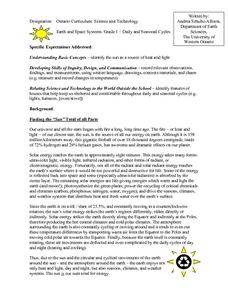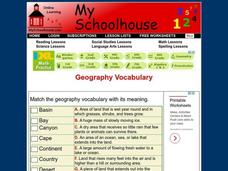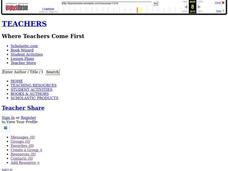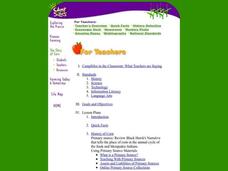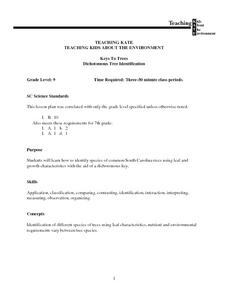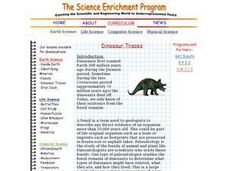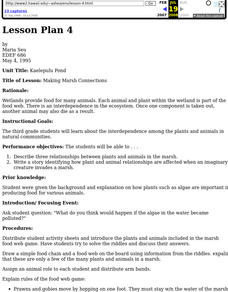Curated OER
Auxin: Indole-3-Acetic Acid
Learners identify auxins from their structural formulas. They understand the process of refluxing in chemical synthesis. Students perform thin layer chromatography using silica gel plates to differentiate chemical substances.
Curated OER
Daily and Seasonal Cycles
First graders identify the sun as a source of heat and light. They identify features of houses that help keep use sheltered and comfortable throughout daily and seasonal cycles. Students are told that summer is the best season to...
Curated OER
Geography Vocabulary
In this identifying geographic terms and their definitions online interactive worksheet, students match the vocabulary words with their definitions. Students match 24 answers.
Michigan Sea Grant
Invasive Species
Learners identify invasive species to the Great Lakes and analyze their impact on the ecosystem. Using photo cards with pictures and facts, young scientists work in small groups to match invasive species with their corresponding...
Curated OER
TE Activity: Environmental Interactions
Students design a web that shows the interactions between the living and non-living parts of the environment. They determine what an environment is and how engineers work together to solve problems. They complete a tally chart that they...
Curated OER
Planting Seeds Around the World
First graders discuss the book The Lorax and research what living things need. In this environmental instructional activity, 1st graders investigate how humans affect the growth of plants. Students conduct an experiment with sunflowers.
Curated OER
Starfish
Learners explore the concept of starfish. In this starfish lesson, students identify the parts of a starfish and how their body works. Learners create a starfish using paint and a cornmeal mixture. They then glue on Cheerios to...
Curated OER
Amino Acids
Identify the properties of proteins and amino acids. Name the groups of elements that identify an amino acid Describe the chemical structure of protein Explain what happen during the denaturation of protein and how the process occurs
Curated OER
Focus on Food Chains
Third graders collect and analyze data about food chains. They conduct Internet research about the habitat of a selected organism, write a narrative, and create a computer slideshow using Kid Pix computer software that illustrates the...
Curated OER
Food Webs and Making Miniature Ecosystems
Young scholars model a food web and create a miniature ecosystem. In this animal interactions lesson plan, students engage in a role playing game which simulates a food web. Young scholars then build miniature ecosystems using pop...
Curated OER
The Story of Corn
Students use primary sources to compare the early development of corn with current techniques of biotechnology and genetically engineered seeds, and identify plants natural to the Americas and those natural to Europe that were part of...
Curated OER
An Emerald Place
Students discover four layers of the rain forest and identify the life of animals at each level.
Curated OER
The Big Hideout
Learners identify the types of camouflage used by animals in the desert. They work together to create their own animal creating their own type of camouflage. They determine how well the camouflage works.
Curated OER
Minerals
Learners apply rules to compare and rank the hardness and softness of minerals. They perform a scratch test on four unknown mineral samples, read a bar graph that illustrates the comparative hardness and softness of four named minerals,...
Curated OER
Keys To Trees: Dichotomous Tree Identification
Ninth graders gather samples of different tree leaves in their neighborhoods, and on school grounds, and identify several species of common South Carolina trees using leaf and growth characteristics with aid of dichotomous key.
Curated OER
Finding Sources of Air Pollution
Young scholars locate on a map the potential areas of air pollution in their community. They identify the possible sources and types of air pollution in the community based on observations and predict and locate on a map potential areas...
Curated OER
Dinosaur Traces
Students identify and interpret the type of evidence found at a typical dinosaur dig and mimic a paleontologist by taking crayon rubbings of simulated bone impressions. After the rubbings are taken, the students reconstruct the complete...
Curated OER
Please the Trees, But Not These, Please!
Students study trees. In this forestry lesson, students complete a variety of activities where they learn the basic parts of a tree and their functions.
Curated OER
Corn: An A-maizing Plant
Students explore the corn crop. In this farming instructional activity, students identify which states are in the corn belt and read about the history of corn, its uses and its development and growth. Students dissect a corn kernel....
Curated OER
Carbohydrates-Simple and Complex
Grain products are staple foods and sources of simple and complex carbohydrates that provide energy for the body. Define simple and complex carbohydrates Identify function and sources of simple and complex carbohydrates Describe how...
Curated OER
Structure and Function of Bulbs, Corms and Rhizomes
Middle schoolers explore the concept of philanthropy and why people give. They investigate the importance of the tulip to Holland and the tradition of giving flowers away. They begin to explore the life cycle of tulips and dissect a bulb...
Curated OER
Butterflies on Camera
Students explore the real experience with the sequence and process of caterpillar-to-butterfly metamorphosis. They actually get to watch the process unfold in the classroom. A Flex-Cam records the video of the process to assure that the...
Curated OER
Growing and Harvesting Fruits and Vegetables
Students learn the various parts of a farm and what is grown on a farm. They also match fruits and vegetables to locations where they are grown.
Curated OER
Making Marsh Connections
Third graders explore the interdependence among the plants and animals in natural communities.



